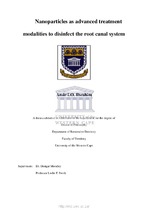Nanoparticles as advanced treatment modalities to disinfect the root canal system
Abstract
Persistent root canal pathogens are one of the main causes of endodontic treatment failure. These pathogens are usually isolated in areas within the root canals that are inaccessible to mechanical instrumentation, chemical irrigants and medicaments resulting in incomplete sterilization of the root canal system. Furthermore, the development of resistant microbial species renders it difficult to disinfect the root canal system using commonly available root canal irrigants and intra-canal medicaments. Intra-canal medicaments are antimicrobial agents that are placed inside the root canal system in order to eliminate the remaining microorganisms that persist after mechanical instrumentation and irrigation. However, their antimicrobial efficacy is effective only against some of the root canal pathogens. Furthermore, the presence of tissue inhibitory factors such as dentine powder and serum albumine within the root canal system inhibits their antimicrobial activity. The use of nanoparticles as antimicrobial agents has recently attracted considerable attention especially in the medical field as a result of their unique antibacterial properties. These properties include their ability to use multiple mechanisms to eradicate microbial cells and their low potentiality to produce microbial resistance. Polymeric nanoparticles such as chitosan nanoparticles (Ch-Np) gained significant interest as a result of their biocompatible and antimicrobial properties. In medicine, several vehicles were designed to carry these antibacterial nanoparticles. Zeolites (Ze) are microporous crystalline hydrated sodium aluminosilicate material that is utilized in the chemical sciences as a carrier for various nanoparticles.

